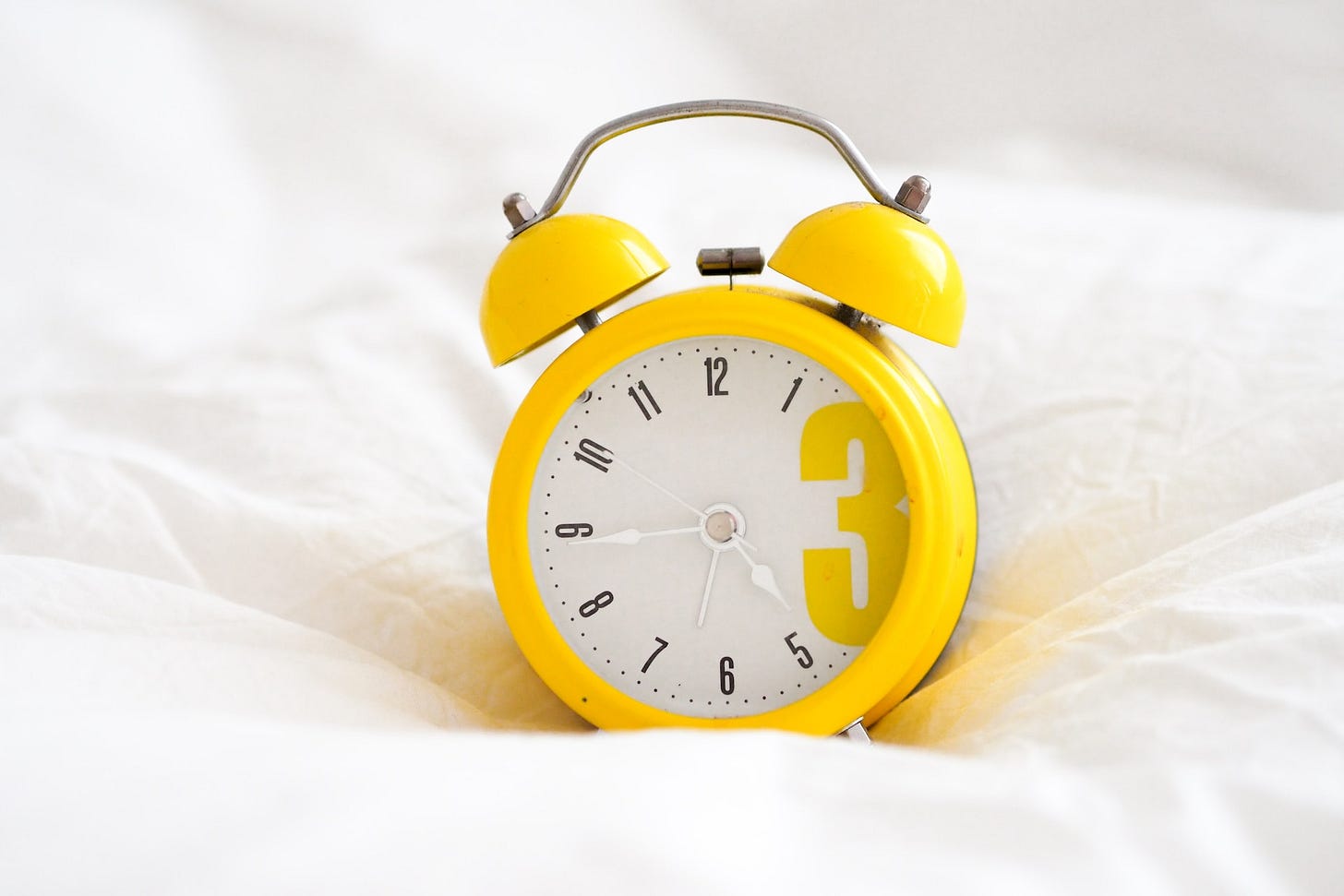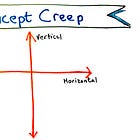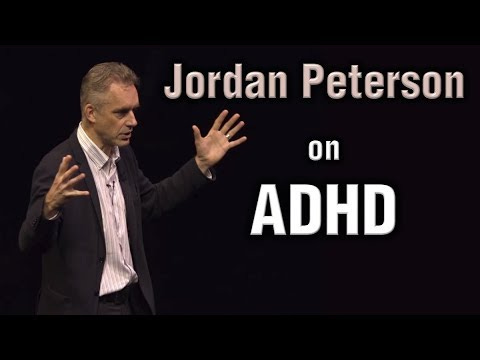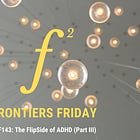Frontiers Friday #144. ADHD (Dailies, Part IV) ⭕️
Dailies, Strategies, Skills and Pills... 5 Recommendations on Dailies.
Today and the coming missives, I will talk about the “Dailies, Strategies, Skills, and Pills”of working with ADHD. This could be useful for you and your clients.
If you’ve missed the previous installments on ADHD, see below:
The “Dailies, Strategies, Skills, and Pills” Framework
I’ve briefly mentioned this in FF139.
When we think in terms of interventions, it is helpful to work it through in this order:
Dailies —> Strategies —> Skills —> Pills
Dailies:
First, we first should look at the daily activities of a person, sleep, exercise, food intake, use of nutritional enhancements, scheduling, etc. We can also think about “dailies” as habit formation.Strategies:
Second, what are some things we can tweak? What are some changes we can make to the environment, tools we can use, etc. We can also think about “strategies” as a set of tactical perspective or plan of action.Skills:
Third, what are the top 3 areas one can work to improve on that has leverage on improving their lives right now? How do design a learning project to help the client get organised? This is often a deceptively tricky one, and all of us need help to identify areas that can actually move the needle based on specific concerns.Pills:
Finally, if need be, medication would also be a consideration. It’s not the first in my decision making, but part of the clinical decision tree.
Pills without the Skills often have a lesser chance of generalising its effects. Meanwhile, Skills that doesn’t daisy chain with Strategies and Dailies lacked a synergy in channeling your efforts to improve.
Some people over emphasis at levels 1 and 2 (i.e., Dailies and Strategies) without connecting to level 3, (i.e., Skills). A telltale sign of this is when you are thinking about how to change your habit or how to to “hack” the issue.
”Dailies” and “Strategies” are often about the How.
“Skills” often are about the What.
At times, you might be able to start with identifying the skills1 It bears repeating that these have to have connective tissue.
Finally, Strategies without connecting to Dailies would like to things being too abstract and less likely to translate to daily living.
OK. now that we have the concept of “Dailies, Strategies, Skills, Pills” primed in our minds, let’s start today’s newsletter with “Dailies.”
Frontiers Friday #144 Five Recommendations on the “Dailies” of ADHD (Part IV)
There are 3 main sections within “Dailies.” Borrowing the phrase from Eric Partake, let’s call this “The Three Alarms.”

👓 Concept: The Three Alarms
There are 3 main sections within “Dailies.” Borrowing the phrase from Eric Partake, let’s call this “The Three Alarms.”
The idea is for you to set up three alarms on your phone:
i. Wake-up Alarmii. Mid-Day Alarm
iii. Go to Bed Alarm
Go ahead and set this on your phone now.2 And then read on.⏰ Wake-Up Alarm
Not only is this alarm to get you out of your comfy bed and get on with your morning bathroom routine, it is to alert you to guide your mind for the day ahead.
Here’s some ideas:
i. ONE THING:
After you’ve looked through your plans for the day, identify and highlight a SINGLE event or thing that is the biggest priority. Even though there’s more than a handful of things to sort out for the day, pick one.
If you use a to-do app list Reminder or Todoist, create a section that is called ONE THING. And you can only have one item in that space.
This seems deceptively simple at first blush, but hard to narrow down each day.
The idea is to guide your mind (and specifically attentional focus and working memory) on a priority, not “priorities”
For more about the principles behind this “One Thing” idea, I would recommend books such as Make Time, The One Thing, and Essentialism.
ii. Anti-Goals
This is the opposite of your “to-do" list. This is a “NOT-TO-DO” list.
Don’t underestimate this.
Somewhere in your psyche will thank you for making the decision at the get-go that, even though this might be good to squeeze in, realistically, this is off the table for today.
iii. Delay Coffee:
Don’t hit the caffeine immediately. Drink some water first. Get hydrated.
Let the body’s stress cortisol do its own work instead of hijacking it immediately. If you drink coffee, aim for 2-3 hours after you’ve waken up.
For more about this, check out hugely popular Andrew Huberman’s podcast.
iv. Eat
Yes, I’m beginning to sound like your mother. But eat something to give you good energy for the day ahead.
For more about this, speak to your mother.
v. Sun
Get out and get some sun into your eyes (and ears, it seems). Your body will thank you not only for Vitamin D, but also for calibrating to the circadian rhythm.
On that note about rhythm, like a rock solid drummer, it is vital we establish a consistent tempo.
For more about this, read The Vitamin D Solution⏰⏰ Second Alarm: Mid-Day
This second alarm is meant to remind you of mid-point. Like an F1 pitstop, even though you probably could keep going, it is unwise to keep going with taking this pause.
Here’s some ideas:
i. Refuel:
In my clinical practice, I notice many people tend not to stop, replenish or even taking a lunch break. At the risk of being annoying now, I want to make the case that emotion researcher Lisa Feldman Barrett has been making about “body budget.” We need the metabolic top-ups in order to be at our optimal.
How much “in debt” are you physiologically? Are you depleted or nourished? Do you have a way to nurture yourself through foods and movement and exercise on a daily basis?
Note: Unless you are in Italy or places with siesta , go easy on carbs, especially at this time of the day.
ii. Mind wander
Take a break to allow your mind to go into diffused mode. Attempting to consistently keep your mind at a focused mode backfires. Diffused mode, or what neuroscientist calls default mode network is really helpful for creative and clear thinking.
iii. Move
Move that body of yours. Go take a walk. Shut the door and dance to Heat Waves.
iv. Play
Park aside time to play.
One of the leading researchers of play, Stuart Brown argued that the lack of play should be treated as serious as malnutrition.
I’ve talked about the role of play extensively in the course Deep Learner, as well these blogs on FullCircles:
Here’s One Mental Model to Change Your Life: Press Play
What is the Opposite of Play? (It’s not work)
The Movement of Recovery: Love, Work, & Play
v. Juxtaposition between familiarity and novelty
Like a good song, there is a paradoxical relationship between what’s familiar and what’s unexpected. A good song entrains you into a sense of familiarity… and then it breaks your expectations, in a good way.
For some people with ADHD, there is a higher need for novelty. Making sure that you have designated periods in the day to mix it up and explore new things/ideas/places would be a useful pattern breaker.⏰⏰⏰ Go to Bed Alarm
Most of us use an alarm to wake us up, but perhaps a better alarm to have is one that alerts us that it’s time to wind down and sleep.
I’ve been using this third alarm for some years now, and I can safely say, how easy it is for me to ignore this and keep going.
What I’ve realised was that my aim to go to bed at 10pm, though ideal, was unrealistic. Adjusting it to 1045pm doesn’t sound like much, but it makes a significant difference.
Here’s some ideas:
i. Wind down
After you’ve set a realistic time on your third and final alarm, when it goes off, begin to wind down.No deep thoughts, Netflix, or pantry food hunting.
Take a warm bath to cool your body temperature. (Not a cool bath, as this would raise your body temperature).
Turn down the lights.
Ease into bed.
ii. Reflect
Who did I become today? How did I work through though the “ONE THING” I intended for today?
This isn’t a big meditative reflection. For some, this might cause rumination and affect their ability to go to sleep. If so, make sure it’s not too close to actual bedtime, and consider off-loading your reflection into a notebook.
iii. Keep a Bedside Notepad
Lurking thoughts? Chatter swirling in your head? Pen it down.
Again, off-load.⏸️ Words Worth Contemplating:
Do not major in minor things.
(See this short essay in my other blog, FullCircles)
Reflection
What is your ONE THING for the day?
Warm Welcome to New Folks on Frontiers of Psychotherapist Development (FPD)
If you are new here, I just want to say a big hello to you and would love to hear from you. Tell me a bit about you and the challenges you face in your development.
Click here to see more details and the archive listed by topics: Frontiers of Psychotherapist Development and Frontiers Friday.
Daryl Chow Ph.D. is the author of The First Kiss, co-author of Better Results, and The Write to Recovery, Creating Impact, and the new book The Field Guide to Better Results .
Reality is much more non-linear than what we prefer.
A note about the alarm sound. Some of you, or your clients, might be sensitive to auditory inputs. The alarm doesn’t have to a siren or a mad-clock ringing sound. It could be customised to a gentle bell or a segment of a song.










You prompted reflection; we are what we do repeatedly. The wealth of information has created a poverty of attention. Our attention is cognitive currency and the rarest and purest form of generosity. Thanks for your time energy and effort. Your are vital to many.